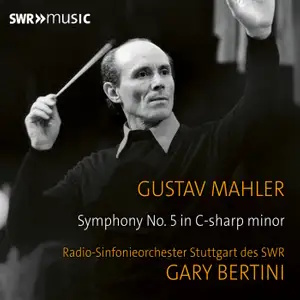
Gustav Mahler (1860–1911)
Symphony No. 5 in C sharp minor (1902)
Radio-Sinfonieorchester Stuttgart des SWR/Gary Bertini
rec. live, 20 March 1981, Liederhalle, Stuttgart, Germany
SWR Music SWR19164CD [67]
Gary Bertini has a formidable reputation among Maher aficionados, one perhaps enhanced by the current unavailability of his recordings of the symphonies, despite critical acclaim.
This is an earlier recording than Bertini’s EMI cycle with the Kölner Rundfunk-Sinfonieorchester; it is with one of those fine, regional, city-based ensembles which subsequently merged with another local orchestra. There are scores of recordings of this seminal symphony, many of which I have on my shelves, but this Mahler Fifth has the distinction of being almost the fastest on record with the sole exception Otmar Suitner’s 1984 recording on Berlin Classics which clocks in at under 64 minutes, whereas most conductors take around five minutes longer than Bertini overall. I thought it might be interesting to compare this specifically with Suitner’s similarly pacy account, which I enjoy (review) – but my MWI colleague Dan Morgan was less impressed (review). As a result, I listened to both straight through, then by movement in tandem.
Suitner’s Trauermarsch is almost two minutes faster than Bertini’s and there is a wildness to the whoops of his brass and his pressing forward in the more cacophonous passages which flirts with anarchy, but the Staatskapelle Berlin keeps up. Bertini is a little more measured – my fellow reviewer aptly calls his demeanour “understated” – and although both were made in the earliest years of commercially available digital recordings, he enjoys a richer, deeper sound than Suitner, which brings out the bass lines more trenchantly. His approach is more dogged – grim rather than frenetic – and his brass is less hard-edged, but there is no lack of trauma in that whirling central section and he finds first more grandeur, then more sorrowful desolation in the coda. Honours even there, then, but for different reasons.
However, Bertini’s opening to the second movement is decidedly too restrained and under-powered for “Stürmisch bewegt”; Suitner finds much more torque and impact. Having said that, maybe Bertini was deliberately holding back as he knows how to build a movement and the listener is happily subjected to a very gradual ratcheting up of tension in which the relationship between the contrasting components is carefully managed, moving inexorably towards a mighty climax. I am still more impressed by Suitner’s drive, however; maybe I’m just a shallow lover of sensationalism!
After such turmoil, the gaiety of the Scherzo is always a welcome contrast and I find that Suitner finds more gaiety and release in the music before the mood starts to turn sour then sombre, five minutes in; Bertini is again more refined and doesn’t hold my attention as firmly. I find Suitner’s slinky treatment of the slow waltz section more seductive compared with Bertini’s slightly stilted manner and the ghostly, central pizzicato passage more atmospheric under Suitner’s hands; my attention wanders during the quiet parts of Bertini’s Scherzo and I find Suitner more engaging – until the final couple of minutes when Bertini’s sudden acceleration is gripping. I realise that I part company with my fellow reviewers here – but such is taste. (The timing for the Scherzo is wrongly indicated as 16:43; it is 15:43, very close to Suitner’s 15:57.)
The famous Adagietto has of course by now become a modern trope as much for the expression of grief as love but it has ever had within it a bitter-sweet intimation of the transient and ephemeral nature of life; Bertini joins most later interpreters by giving it plenty of space at eleven minutes; Suitner takes a minute less, in line with his more direct and incisive way, but it is hardly swift by any standards. Both are beautiful, Suitner first seemingly a little mellower in both sound and affect, despite being faster and less warmly recorded. Once more Bertini gives the ending full emotional weight but Suitner is no less effective.
The remarkable finale – a riotous masterpiece of counterpoint intricacy – is similarly timed by both conductors but I find Suitner to be the more exciting, especially in his sparkling execution of the coda at breakneck speed. I would also add that the virtuosity of the Staatskapelle Berlin exceeds that of the SWR here in brilliance and dexterity; I hear greater clarity in their articulation and despite Suitner’s being a studio recording, he has the edge over Bertini’s live performance for drama and immediacy.
The sound is really excellent; very few coughs and great presence but on balance, if you want a sharp, fast, driven take on this wonderful symphony, then Suitner’s is the more rewarding, good as Bertini is. Given Bertini’s reputation and Suitner’s comparative obscurity, my findings surprised me – but there it is.
Ralph Moore
Previous review: Dominic Hartley (March 2025)
Buying this recording via a link below generates revenue for MWI, which helps the site remain free




















